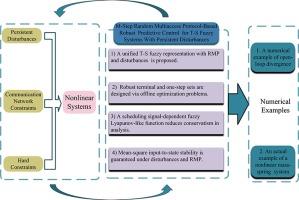M-step random multiaccess protocol-based robust predictive control for Takagi-Sugeno fuzzy systems with persistent disturbances
IF 2.7
1区 数学
Q2 COMPUTER SCIENCE, THEORY & METHODS
引用次数: 0
Abstract
This paper investigates the issue of M-step robust fuzzy model predictive control (RFMPC) for a category of nonlinear systems that are described using Takagi-Sugeno (T-S) fuzzy models, subject to communication network constraints and persistent bounded disturbances. To mitigate data collisions and improve data transmission reliability, a random multiaccess protocol (RMP) is integrated into the M-step RFMPC framework, resulting in the proposed M-step RMP-based RFMPC approach. Specifically, a unified representation is developed to model the interplay between T-S fuzzy nonlinearities and the RMP for nonlinear systems subject to persistent bounded disturbances. Optimization problems are formulated to determine the terminal constraint set and robust one-step sets for T-S fuzzy systems in an offline manner. Utilizing a scheduling signal-dependent quadratic function approach, a novel M-step RMP-based RFMPC algorithm is proposed, comprising both offline and online components. Sufficient conditions are established to ensure both the feasibility of the proposed algorithm and the mean-square input-to-state stability of the resulting closed-loop system. Finally, the effectiveness and applicability of the proposed M-step RMP-based RFMPC approach are demonstrated through two illustrative examples.

基于m步随机多址协议的持续扰动Takagi-Sugeno模糊系统鲁棒预测控制
本文研究了一类非线性系统的m步鲁棒模糊模型预测控制(RFMPC)问题,该系统使用Takagi-Sugeno (T-S)模糊模型描述,受通信网络约束和持续有界干扰。为了减少数据冲突,提高数据传输的可靠性,将随机多址协议(RMP)集成到m步RFMPC框架中,从而提出了基于m步RMP的RFMPC方法。具体地说,建立了一个统一的表示来模拟受持续有界扰动的非线性系统的T-S模糊非线性和RMP之间的相互作用。为确定T-S模糊系统在离线状态下的终端约束集和鲁棒一步集,提出了优化问题。利用与调度信号相关的二次函数方法,提出了一种新的基于m步rmp的RFMPC算法,该算法包括离线和在线两部分。建立了保证算法可行性和闭环系统输入状态均方稳定性的充分条件。最后,通过两个实例验证了所提出的基于m步rmp的RFMPC方法的有效性和适用性。
本文章由计算机程序翻译,如有差异,请以英文原文为准。
求助全文
约1分钟内获得全文
求助全文
来源期刊

Fuzzy Sets and Systems
数学-计算机:理论方法
CiteScore
6.50
自引率
17.90%
发文量
321
审稿时长
6.1 months
期刊介绍:
Since its launching in 1978, the journal Fuzzy Sets and Systems has been devoted to the international advancement of the theory and application of fuzzy sets and systems. The theory of fuzzy sets now encompasses a well organized corpus of basic notions including (and not restricted to) aggregation operations, a generalized theory of relations, specific measures of information content, a calculus of fuzzy numbers. Fuzzy sets are also the cornerstone of a non-additive uncertainty theory, namely possibility theory, and of a versatile tool for both linguistic and numerical modeling: fuzzy rule-based systems. Numerous works now combine fuzzy concepts with other scientific disciplines as well as modern technologies.
In mathematics fuzzy sets have triggered new research topics in connection with category theory, topology, algebra, analysis. Fuzzy sets are also part of a recent trend in the study of generalized measures and integrals, and are combined with statistical methods. Furthermore, fuzzy sets have strong logical underpinnings in the tradition of many-valued logics.
 求助内容:
求助内容: 应助结果提醒方式:
应助结果提醒方式:


